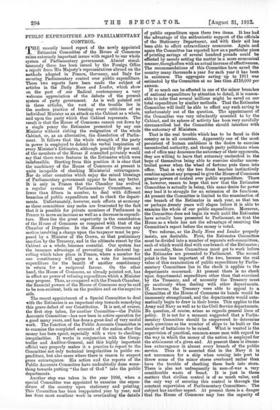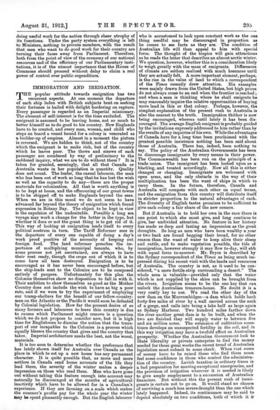PUBLIC EXPENDITURE AND PARLIAMENTARY CONTROL.
ITIHE recently issued report of the newly appointed 1 ' Estimates Committee of the House of Commons raises extremely important issues with regard to our whole system of Parliamentary government. AlMost simul- taneously there has been issued by the Foreign Office a report from His Majesty's representatives abroad on the methods adopted in France, Germany, and Italy for securing. Parliamentary control over public expenditure. These two reports have been made the subject of articles in the Daily News and Leader, which show on the part of our Radical contemporary a very welcome appreciation of the defects of the present system of party government. As is well pointed out in these articles, the root of the trouble lies in the modern practice of treating every criticism of an individual Minister as an attack on the Cabinet as a whole, and upon the party which that Cabinet represents. The result is that the House of Commons cannot cut down by a single penny the Estimates presented by any one Minister without risking the resignation of the whole Cabinet, or, as an alternative, the dissolution of Parlia- ment. It follows that the whole strength of the party in power is employed to defend the verbal inspiration of every Minister's Estimates, although possibly 90 Per cent. of the members of the House if consulted privately would say that there were features in the Estimates which were indefensible. Starting from this position it is clear that the 'machinery of the House of Commons at present is quite incapable of checking Ministerial extravagance. Nor do other countries which enjoy the mixed blessings of Parliamentary government appear to fare any better. It is only in France that the Chamber has evolved a regular systein of Parliamentary Committees, no fewer than fifteen in number, to deal with different branches of public expenditure and to check the depart- ments. Unfortunately, however, such efforts at economy as these committees may make are frustrated by the fact that it is possible for private members of Parliament in France to move an increase as well as a decrease in expendi- ture. Here lies the great superiority in the constitution of the House of Commons as compared with that of the Chamber of Deputies. In the House of Commons any motion involving a charge upon the taxpayer must be pro- posed by a Minister of the Crown, so that preliminary sanction by the Treasury, and in the ultimate resort by the Cabinet as a whole, becomes essential. Our system has the immense advantage of preventing the electoral log- rolling which takes place in France, where a member for one constituency will agree to a vote for increased expenditure for the benefit of another constituency in return for a reciprocal favour. On the other hand, the House of Commons, as already pointed out, has in effect no power of refusing expenditure which a Minister may propose. Thus, as compared with the French Chamber, the financial powers of the House of Commons may be said to be non-existent, both on the positive and on the negative side.
The recent appointment of a. Special Committee to deal with the Estimates is an important step towards remedying this grave defect of our Constitution. It is not, of course, the first step taken, for another Committee—the Public Accounts Committee—has now been in active operation for a good many years, and has done a great deal of -very useful work. The function of the Public Accounts Committee is to examine the completed accounts of the nation after the money has been spent, especially with a view to checking irregularities. It works in conjunction with the Comp- troller and Auditor-General, and this highly important official very properly makes it a practice to report to the Committee not only technical irregularities in public ex- penditure, but also cases where there is reason to suspect gross extravagance. His action and the reports of the Public Accounts Committee have undoubtedly done some- thing towards putting "the fear of God" into the public departments.
Another step was taken in the year 1906, when a special Committee was appointed to examine the expen- diture of the country upon stationery and printing. This Committee has been reappointed year by year, and has done most excellent work in overhauling the details of public expenditure upon these two items. It has had the advantage of the enthusiastic support of the officials of the Stationery Department, and with their aid has been able to effect extraordinary economies. Again and again the Committee has reported how on a particular piece of printing savings of several hundred pounds could bo effected by merely setting the matter in a more economical manner, though often with an actual increase of effectiveness.
The recommendations of this Committee have saved the country many thousands a year for each year it has been in existence. The aggregate saving - up to 1911 was estimated by the Committee at no less than £110,000 per annum.
If so much can be effected in one of the minor branches of national expenditure by attention to detail, it is reason- able to infer that several millions might be saved on our total expenditure by similar methods. That the Estimates Committee will itself be able to effect any such saving is unfortunately out of the question. The appointment of the Committee was very reluctantly assented to by the Cabinet, and its sphere of activity has been very carefully circumscribed lest the Committee should interfere with the autocracy of Ministers.
That is the real trouble which has to be faced in this country as in all countries. Apparently one of the most persistent of human ambitions is the desire to exercise uncontrolled authority, and though party politicians when out of office may denounce the autocracy of their opponents they are willing to leave that autocracy unchecked in the hope of themselves being able to exercise similar uncon- trolled power when the wheel of fortune puts them into office. That is- why the two front benches instinctively combine against any proposal to give the House of Commons greater powers of control over public expenditure. There is, however, reason to hope that now that the Estimates Committee is actually in being, this same desire for power may lead it to struggle for an extension of its functions. At present the Committee is limited to the examination of one branch of the Estimates in each year, so that ten or perhaps twenty years will elapse before it is able to examine the whole of our public expenditure. Moreover, the Committee does not begin its work until the Estimates have actually been presented to Parliament, so that the House as a whole has not the advantage of receiving the Committee's report before the money is voted.
Two reforms, as the Daily News and Leader properly insists, are desirable. First, the Estimates Committee must be divided into a number of separate sub-committees, each of which would deal with one branch of the Estimates ; and secondly, these Committees must get to work before the Estimates are presented to Parliament. The second point is the less important of the two, because the real value 'of this examination of public expenditure by Parlia- mentary Committees lies in the check it applies to the departments concerned. At present there is no check upon departmental expenditure other than that exercised by the Treasury, and of necessity the Treasury must go cautiously when dealing with other departments. If, however, the Treasury were able to appeal to a Committee of the House of Commons its hands would be immensely strengthened, and the departments would auto- matically begin to draw in their horns. This applies to the Army and Navy as well as to the Civil Service departments. No question, of course, arises as regards general lines of policy. It is not for a moment suggested that a Parlia- mentary Committee should be empowered to determine such questions as the number of ships to be built or the number of battalions to be raised. What is wanted is the supervision of practical, common-sense men with regard to the way in which the money of the nation is employed for the attainment of a given end. At present there is shame- less extravagance in almost every branch of the public service. Thus it is asserted that in the Navy it is not uncommon for a ship when coming into port to throw some of the minor stores overboard rather than have the trouble of checking them back into store. There is also not unfrequently in men-of-war a very considerable waste of bread. It is just in these matters that civilian control is of so much value, and the only way of securing this control is through the constant supervision of Parliamentary Committees. The subject has another aspect. At present there is a danger that the House of Commons - may lose the capacity of doing useful work for the nation through sheer atrophy of its functions. Under the party system everything is left to Ministers, nothing to private members, with the result that men who want to do good work for their country are turning their faces away from Parliament. Therefore, both from the point of view of the economy of our national resources and of the efficiency of our Parliamentary insti- tutions, it is of the utmost importance that the House of Commons should proceed without delay to claim a real power of control over public expenditure.



































 Previous page
Previous page